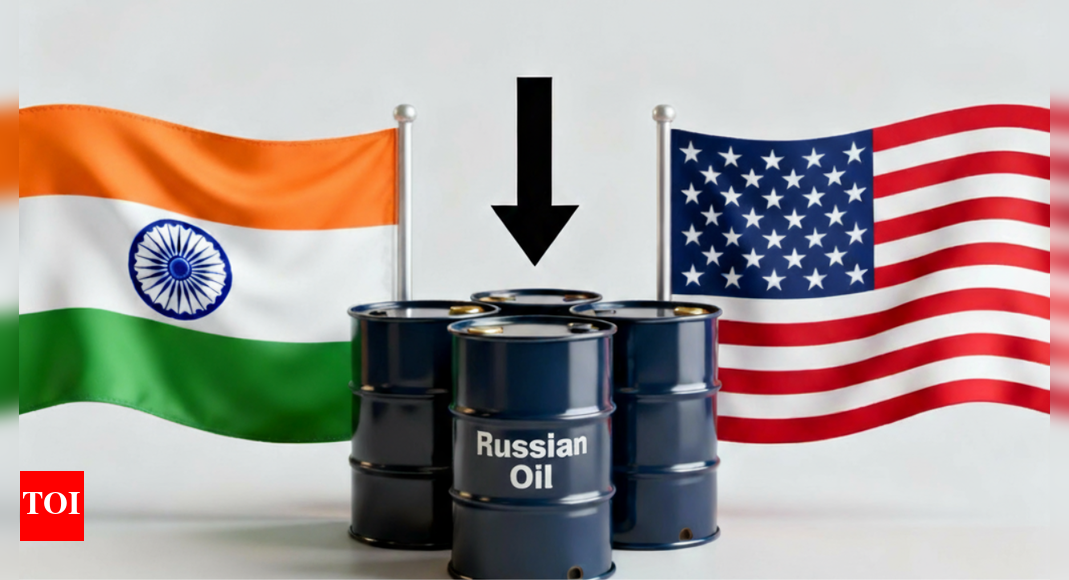NEW DELHI: Reliance Industries and state-run refiners are looking at suspending Russian crude imports after the US on Wednesday sanctioned Rosneft and Lukoil, the largest exporters of those barrels.Reliance, the single-largest Indian consumer of Russian oil, will be the biggest loser as it buys most of those barrels directly from Rosneft under a term contract. Russian crude makes up about half of the feed at the company’s 35-million-tonne complex.“Recalibration of Russian oil imports is ongoing and Reliance will be fully aligned to GOI (Government of India) guidelines,” a Reliance spokesman told Reuters.The curbs on Rosneft will also make life harder for Nayara Energy, which is half owned by the Russian giant and struggling to stay afloat since September when the EU imposed sanctions. Analysts said selling products from its 20-million-tonne refinery at Gujarat’s Vadinar will be tough.Importers can receive contracted shipments till November 21. Unlike previous sanctions, when Russian oil could be traded within the $60 price cap, this time the curbs are directed at the companies, making their barrel tainted after the cut-off date.

So far this year, 36% of India’s crude has been from Russia, with Rosneft and Lukoil supplying nearly 60% of this.A senior executive of IndianOil, one of the largest consumers of Russian oil among state-run refiners, said those barrels make up 15-18% of their crude basket.“It is too early. We are looking at the fine print. But it will not be too difficult to arrange alternative supplies from West Asia or other geographies such as Africa, the US etc. But others will also be crowding those markets, which will jack up benchmark prices and premia on other crude. This will impact margins. But Russian oil somehow finds its way into the market as we have seen in the past… but banking issues may crop up,” he said.Sure enough, benchmark Brent crude price shot up 5%, or by $2.9 a barrel, to 65.50 on Thursday. “The good thing is prices are in their 60s. Even if they rise to $70, it will be manageable.”US President Donald Trump has been mounting pressure on countries such as India and China to lower oil imports from Russia as part of a plan to squeeze Moscow to come to the negotiating table on the Ukraine conflict. Trump imposed secondary tariffs of 25% on India, in addition to 25% reciprocal tariffs, citing Russian crude purchases.Late Thursday, Russian President Vladimir Putin hit back at the US. “This is, of course, an attempt to put pressure on Russia. But no self-respecting country and no self-respecting people ever decides anything under pressure.” He said breaking the balance in the global energy markets could lead to a hike in prices that would be uncomfortable for countries such as the US.As a country, the loss of discounted Russian oil could potentially cost India, which meets 85% of its crude requirement through imports, an estimated annual savings of about $4-5 billion on its oil import bill. Ratings agency ICRA estimates that replacement supplies at market prices would increase the oil import bill by 2%, potentially impacting the macroeconomic parameters.Sumit Ritolia, analyst at global real-time data and analytics provider Kpler, said the term arrangement with Rosneft could “introduce some near-term friction, especially from a compliance standpoint for RIL. The company would understandably wish to avoid any exposure to OFAC (US Office of Foreign Assets Control) and it will need to look at its Russian crude strategy.”The immediate operational impact on state-run refiners, he said, “should remain limited” as they buy Russian crude through tender from third-party traders. “However, secondary sanctions related to logistics and financing could pose indirect challenges.”




